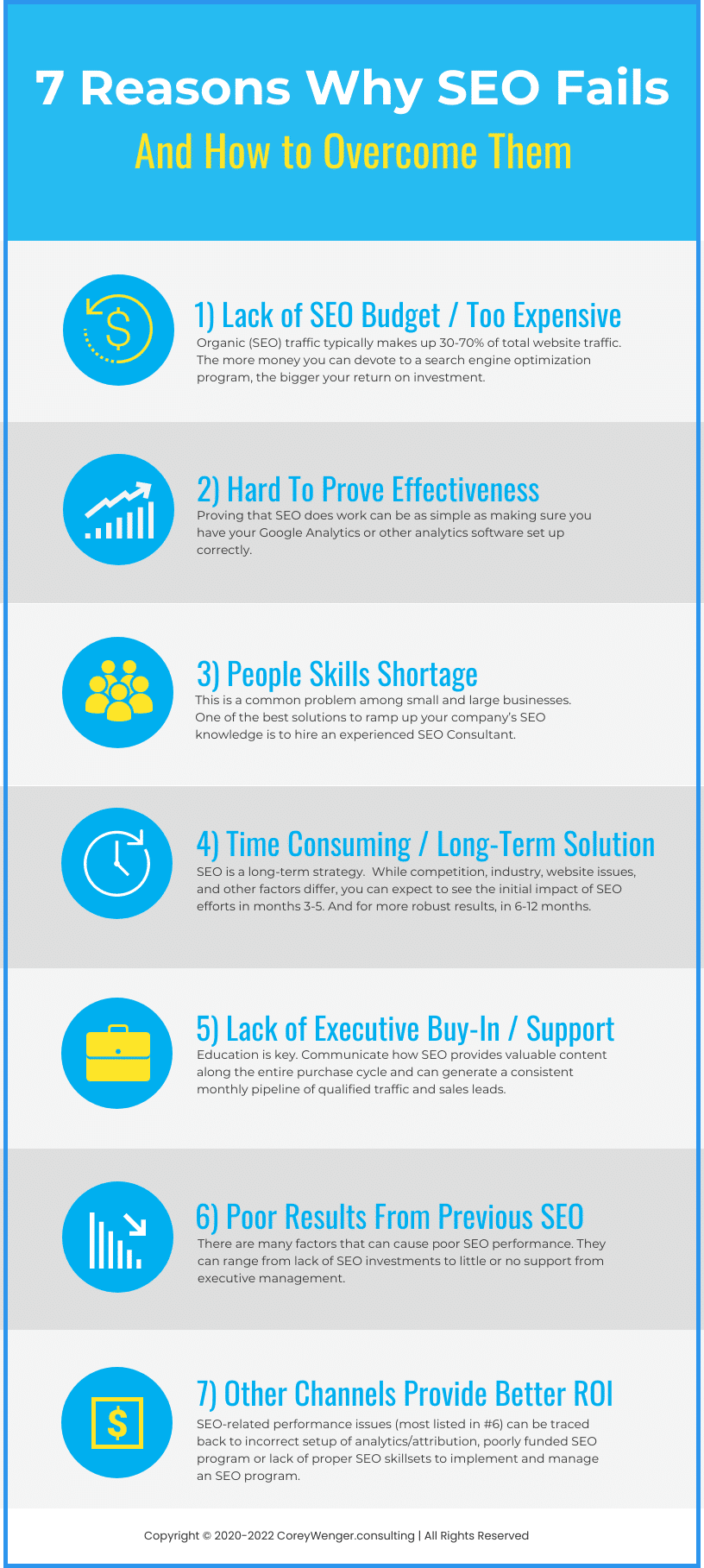
Quick Links
SEO Fails: Budgets and SEO Skill Gaps Are Most Common
There are many explanations of why SEO can fail for a business. Here are the most common reasons why SEO fails and what you can do to improve your SEO rankings and results dramatically.
2. Hard to prove effectiveness.
4. Time consuming / long-term solution.
5. Lack of executive buy-in and support.
6. Poor results from previous SEO attempts.
7. Other channels provide better ROI.
#1) Lack Of SEO Budget.
Not having an SEO budget or an appropriate monthly SEO budget is usually the number one reason why SEO fails.
Organic (SEO) traffic typically makes up 30-70% of total website traffic. Since this is your #1 traffic and lead generator, why would you not invest in it?
The more money you can devote to a search engine optimization program, the bigger your return on investment.
Larger budgets allow you to build a better website, improved content, use the best industry SEO tools, hire digital marketing talent, bring in top-notch SEO consultants, and other beneficial factors.
If you need to increase your SEO budget, reallocate marketing funds from your paid search or other marketing projects or channels. It does not make sense to spend $1,000s-$10,000s each month on paid search while you neglect to invest in SEO properly. At a minimum, invest in SEO on what you spend on paid search campaigns.
If you are having trouble validating SEO budgets, then use customer lifetime value.
Let us walk through an example.
A visitor fills out a lead generation form, and that new customer is worth $3,500. For every 100 site visitors, one becomes a customer. That would make each site visitor worth $35.
If the web page generates 15,000 visitors per month, that web page is worth $525,000 a month.
If you invest in an SEO program that increases organic traffic by 15%, that is 2,250 new visitors, and an increase of $78,750 per month in organic traffic value.
If your profit margin is 30%, to break even on SEO spend, you could pay $283,500 for an SEO program.
If an Indianapolis SEO Consultant proposes an SEO program for 20% of that budget (around $56,700), you should immediately say – Yes.
Please remember – this is for “one” website page. What impact would this have on your entire website?
What Is A Realistic Monthly SEO Budget?
A reasonable SEO monthly budget does vary depending on the complexity of your website, level of competition, industry, and many other factors.
Generally, you can expect monthly SEO budgets to fall within these ranges.
✔️ Local Business SEO Services: $500-$1,500 per month
✔️ Small Business SEO Services: $1,500-$4,500 per month
✔️ Medium Business SEO Services: $4,500-$15,000 per month
✔️ Large Business SEO Services: $15,000-$45,000 per month
SEO is one of the best marketing investments you can make.
Now is the time to up your SEO budgets to appropriate levels and reap the benefits of more traffic and increased leads/sales.
Visit SEO Pricing page to learn more.
#2) Hard To Prove Effectiveness.
 If you are having trouble measuring performance for organic conversions, you are probably having other channel performance tracking problems too.
If you are having trouble measuring performance for organic conversions, you are probably having other channel performance tracking problems too.
Proving that SEO does work can be as simple as making sure you have your Google Analytics or other analytics software set up correctly.
This includes setting up goals and funnels, tracking ecommerce sales, connecting Google Analytics with your Google Search Console, and setting up other KPIs and site events you want to track.
The simplest way to capture a conversion goal is to create a unique “Thank You” page. Anytime a web visitor gets to this page, the conversion and traffic source is counted.
For occasions where you want to track paid non-Google campaigns, use Google’s Campaign Builder to create custom URL parameters to track traffic source data.
#3) People Skills Shortage.
 This is a common problem among small and large businesses.
This is a common problem among small and large businesses.
To diagnose, implement, and manage an ongoing successful SEO program, it takes a unique blend of digital marketing skillsets. These include on-page, technical, and off-page optimization techniques and best practices and SEO industry tool skills.
One of the best solutions to ramp up your company’s SEO knowledge is to hire an experienced SEO Consultant.
In this manner, you can perform an SEO website audit to determine what obstacles you need to overcome to boost rankings and lead performance.
An Indianapolis SEO Consultant can also help develop and implement an SEO program using the latest best practices and proven techniques to help drive search engine rankings and sales leads.
Last, an SEO Consultant can help you define what specific in-house resources you need to manage an ongoing SEO program effectively. This includes helping to write position job descriptions and sitting in during interviews.
#4) Time Consuming / Long-Term Solution.
 SEO is a long-term strategy. If anyone tells you it is not – you need to hang up or run from them immediately.
SEO is a long-term strategy. If anyone tells you it is not – you need to hang up or run from them immediately.
While competition, industry, website issues, and other factors differ, you can expect to see the initial impact of SEO efforts in months 3-5. And for more robust results, in 6-12 months.
While it is possible to see results within the first couple of months, this is rarely the case.
In the first couple of months, this is where you go through the website SEO audit phase.
Starting in months two or three, SEO implementation begins. This involves various factors, including content optimization, meta tag optimization, keyword and competitor research, technical SEO site fixes, backlinks building, and related tasks.
If you talk to any agency or SEO Consultant that says otherwise, it is a clear sign they do not know what they are doing.
#5) Lack Of Executive Buy-In And Support.
 Search engine optimization will ultimately fail if you don’t get executive management support.
Search engine optimization will ultimately fail if you don’t get executive management support.
Education is key.
It is essential to understand where everyone falls on the SEO expertise scale. Some executives may have a solid foundation in SEO, while others may not have a clue.
Before you present to the C-Suite, gather information so you can craft your presentation to fit their style and information needs.
For example, instead of talking about on-page or technical SEO factors, walk through how prospective customers research products and services and, ultimately, make an online purchase.
Communicate how SEO provides valuable content along the entire purchase cycle and can generate a consistent monthly pipeline of qualified traffic and sales leads.
One of the best tools to gain executive support is the website SEO Audit.
This audit will provide management with the information they are looking for; all backed up by research and analysis. The audit provides many SEO benefits.
For example, the SEO audit can provide these types of information.
✔️ Current baseline of organic traffic, leads, sales, and other KPI data.
✔️ Website problems need to be fixed to improve search rankings and leads.
✔️ Implementation resources needed for SEO fixes.
✔️ Competition (What are competitors doing on the SEO front and your company is not?)
✔️ Specific keywords your competitors are targeting and ranking for (driving traffic and leads.)
✔️ SEO performance scenarios – What do the next 12 months of traffic, leads, and sales look like if you do nothing? What do these metrics look like with moderate SEO efforts? High efforts?
If the C-Suite is still skeptical of the value of SEO after reviewing the audit, then pitch an SEO pilot program.
This involves setting up website analytics, conversion tracking, and defining high-value keywords and website pages for the SEO pilot program. It is vital to choose keywords that you can rank well for and show clear ROI.
By providing education, research, and leads/sales impact scenarios through the SEO Audit, you can obtain executive management support and buy-in.
#6) Poor Results From Previous SEO Attempts.
 If your company has tried SEO programs in the past but failed to see results, many reasons can be attributed to a lackluster achievement.
If your company has tried SEO programs in the past but failed to see results, many reasons can be attributed to a lackluster achievement.
Here are common factors that cause SEO to fail.
✔️ Chose highly competitive search terms you had little chance of ranking for in the search engines.
✔️ Used outdated (old school) SEO tactics and techniques.
✔️ Did not give the SEO program enough time to mature and see the results of your efforts.
✔️ Did not fix the core SEO website design issues affecting SEO.
✔️ Over optimized your content and saw rankings decrease.
✔️ Worked with an SEO agency or Consultant that underperformed.
✔️ Chose a cheap SEO vendor.
✔️ You or an agency built poor-quality backlinks that hurt SEO rankings.
✔️ Too small of an SEO budget to make any measurable business impact.
✔️ Did not have adequate internal resources to implement SEO effectively.
The important thing is to learn from the past and use it to make better decisions in the future.
When implemented correctly, SEO programs are an effective lead and sales generation tool.
#7) Other Channels Provide Better ROI.
 For most companies and industries, SEO programs are effective at driving quality leads and sales growth.
For most companies and industries, SEO programs are effective at driving quality leads and sales growth.
Organic traffic typically makes up 30-70% of total website traffic. Organic traffic is a very important source of traffic, leads and sales.
In rare instances, do other digital or traditional marketing channels provide better ROI.
In my experience, SEO-related performance issues (most listed in #6) can be traced back to incorrect setup of analytics/attribution, poorly funded SEO program or lack of proper SEO skillsets to implement and manage an SEO program.
It is common to experience high ROIs with SEO programs.
Final Thoughts
It this article, we discussed seven common reasons why SEO fails and what to do to overcome them. Factors that negatively affect SEO efforts can range from not enough funding to make a business impact to lack of executive management support and buy-in. By addressing these prevalent scenarios, you can increase SEO rankings, boost sales leads, and drive sales growth.
SEO audits are a great way to provide executive management with research and analysis to support your company’s SEO program and goals. To help understand the full benefits of SEO, read this article: “What Are The Benefits Of SEO And A Website SEO Audit?” Follow this link to learn more about Corey Wenger SEO Audits.
Learn more about Corey Wenger National SEO Consulting Services, Local SEO Consulting Services, SEO Consultant Services, Technical SEO Audits or SEO Audit Services.
About the Author
Corey has over 20 years of Digital Marketing and SEO experience and is the owner of Corey Wenger SEO Consulting. Corey is an SEO Expert and Consultant and has deep knowledge in troubleshooting, educating, coaching, guiding, and scaling your SEO Strategies and tactics so that you can increase keyword rankings, leads, and sales. Additionally, Corey helps businesses develop SEO Strategies to compete more effectively against search engine competition. Corey is also an SEO Trainer and enjoys helping his clients learn and master SEO tactics, tools, and strategies.
Ready to get your SEO Audit started?



